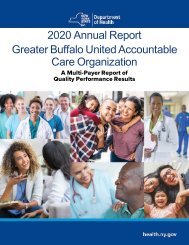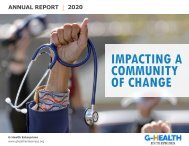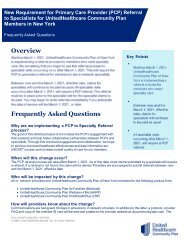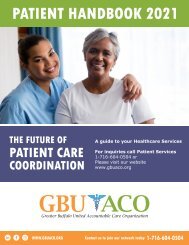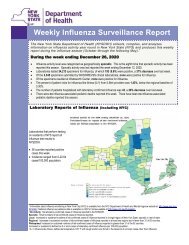Future of Health Care 2020
- No tags were found...
You also want an ePaper? Increase the reach of your titles
YUMPU automatically turns print PDFs into web optimized ePapers that Google loves.
HE FUTURE OF HEALTH CARE // HEALTH-CARE EQUITY<br />
Underwood has plan to tackle health-care disparities<br />
CONTINUED FROM PAGE 31<br />
Underwood spoke about health<br />
disparities in Buffalo and his plan to<br />
help fix the issues.<br />
Define the problem for us. I’ve<br />
dealt with health-care disparities<br />
in research and in my clinical care<br />
for more than 20 years. Here in<br />
Buffalo, years ago we put together the<br />
African-American Disparities Task<br />
Force, and we produced a document<br />
highlighting health-equity issues in<br />
the region, which are mostly focused<br />
on the East Side. Those ZIP codes<br />
are at higher risk <strong>of</strong> mortality from<br />
cardiovascular disease, diabetes,<br />
cancer. Those diseases have a lot to do<br />
with proper transportation, adequate<br />
housing and a whole host <strong>of</strong> financial<br />
or economic circumstances.<br />
What is your task force planning to<br />
do? The goal here is to address those<br />
things and to uplift the community.<br />
A community is only as strong as its<br />
weakest link, and one part <strong>of</strong> that<br />
chain is much weaker than all the<br />
rest. So it’s one thing to talk about a<br />
problem, and it’s another to say, ‘OK,<br />
what resources are we going to bring<br />
to bear to solve it? And who are we<br />
going to be accountable to?’<br />
The strategy is going to be multifaceted,<br />
public and reach across<br />
disciplines. One aspect is going to be<br />
agenda-driven research so that we<br />
identify interventions, prove that they<br />
work and then bring them to scale. We<br />
are going to work with partners from<br />
inside and outside the community to<br />
put long-term changes in place.<br />
Dr. Willie Underwood III is a board-certified urologist who has spent his career on issues <strong>of</strong> access to quality health<br />
care. He says his new role leading the Buffalo Center for <strong>Health</strong> Equity isn’t just about lifting the East Side, but about<br />
supporting health outcomes for the entire community.<br />
That sounds ambitious. Everyone<br />
sees our society as us and them, but<br />
research has shown us that it’s just us,<br />
and that we’re sort <strong>of</strong> in this together.<br />
We’re hoping one thing that comes<br />
out <strong>of</strong> this coronavirus crisis is a<br />
newly reinvigorated effort to address<br />
social determinants <strong>of</strong> health in a way<br />
that we can resolve them. We want to<br />
make the East Side <strong>of</strong> Buffalo a strong<br />
JOED VIERA<br />
link within the chain.<br />
We’ve been working on this for<br />
years, but really we’re just getting<br />
started.<br />
— Dan Miner<br />
WORD FROM THE SPONSOR: TROCAIRE COLLEGE<br />
Proud to educate WNY health care workforce<br />
As our society has been engaged<br />
in fighting the COVID-19<br />
global pandemic, we have been<br />
reminded on a daily basis the critical<br />
role health care workers play within<br />
our community. Many have referred<br />
to health care workers as the new<br />
“army” our society needs to fight this<br />
pandemic and other future healthrelated<br />
crises.<br />
For over 60 years, Trocaire College<br />
has been proud to educate and train<br />
the Western New York health care<br />
workforce. Whether current students<br />
preparing to enter the workplace or<br />
alumni who have already heeded<br />
the call to serve, Trocaire graduates<br />
are workplace ready from day one<br />
to join other frontline workers to<br />
deliver quality care. Building on the<br />
foundation <strong>of</strong> the Sisters <strong>of</strong> Mercy<br />
who came to Buffalo to serve its ever<br />
increasing population by building<br />
schools and health care facilities,<br />
Bassam M.<br />
Deeb, Ph.D.,<br />
is President <strong>of</strong><br />
Trocaire College<br />
Trocaire today<br />
remains focused<br />
on the Buffalo<br />
Niagara region<br />
with its ever<br />
increasing racial<br />
diversity as well<br />
as its urban and<br />
suburban mix.<br />
The focus on<br />
infusing diversity<br />
in the field <strong>of</strong><br />
health care has<br />
become even<br />
more critical<br />
as the Buffalo Niagara region has<br />
welcomed New Americans as it has<br />
done so many times throughout its<br />
history. This trend has been noted<br />
for decades, and the need for more<br />
racial and ethnic diversity in the<br />
health care field is only growing. A<br />
<strong>Health</strong>Affairs.org research article,<br />
The Case for Diversity in <strong>Health</strong> <strong>Care</strong><br />
Workforce notes that “a workforce<br />
that mirrors the population will<br />
help to expand health care access<br />
for the underserved, foster research<br />
in neglected areas <strong>of</strong> societal need,<br />
and enrich the pool <strong>of</strong> managers<br />
and policymakers to meet the needs<br />
<strong>of</strong> a diverse population.” Trocaire<br />
has been a strong contributor and<br />
supporter to increasing qualified and<br />
diverse health care providers that<br />
mirror the population <strong>of</strong> the Buffalo<br />
Niagara region.<br />
Trocaire has already executed<br />
several initiatives to increase equity<br />
in this area, knowing the outcomes<br />
will benefit the community at large.<br />
The College launched a Cultural<br />
Competency Certificate program<br />
open to both students and employees,<br />
bringing in community leaders to<br />
speak on a variety <strong>of</strong> issues and<br />
fostering opportunities to increase the<br />
knowledge, sensitivity and skills in<br />
cross-cultural interactions on both an<br />
institutional and an individual level.<br />
In addition, thanks to a federally<br />
funded grant, Trocaire created the<br />
Pathways to Nursing Success Program.<br />
In partnership with the Erie Niagara<br />
Area <strong>Health</strong> Education Center and the<br />
Community <strong>Health</strong> Center <strong>of</strong> Buffalo,<br />
the program is helping to diversify the<br />
local nursing workforce by addressing<br />
educational, social and financial<br />
barriers for minority students who<br />
wish to enter and be successful in the<br />
field. Now more than halfway through<br />
the program, the enrolled students are<br />
already seeing the positive change the<br />
Pathways program is having on their<br />
lives.<br />
Diversity in health care matters. It<br />
is about a commitment to ensuring<br />
all backgrounds, beliefs, ethnicities,<br />
perspectives and experiences are<br />
represented within the various<br />
health-related career paths to meet<br />
the needs <strong>of</strong> an increasingly diverse<br />
population and to provide culturally<br />
competent and quality care.<br />
32 THE FUTURE OF HEALTH CARE BUFFALO BUSINESS FIRST






